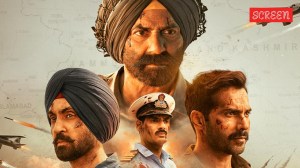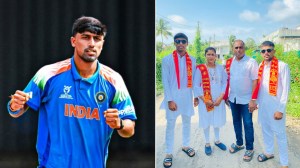CHUCK THE VINDICATIVE!
Our correspondent on how Shah Rukh Khan8217;s latest film restores the dignity of a real-life goalkeeper who was let down by the nation in 1982

HE is the original Kabir Khan 8212; no semblance in physique or disposition to Shah Rukh Khan who plays the role in Chak de India. If you have heard of Mir Ranjan Negi, you are likely to appreciate the movie better. Negi hit the headlines and the front page back in 1982 for all the wrong reasons due to an ignorant, misguided, vindictive and irresponsible media.
Trauma and tragedy have been by-words in the life of this shy and sensitive customs officer from Mumbai, who has been a dear friend of mine for the past 25 years. And now, a quarter a century since being branded a 8220;traitor8221;, Negi8217;s life has come a full circle.
Presently, not just those on the Bollywood beat, but also sports scribes seek him out. 8220;I have been receiving hundreds of calls daily since the movie was released. My life has yet again turned upside down,8221; was what he said, calling me on Independence Day, just minutes after I had watched the film.
I had messaged him that I would be seeing the film and he had replied: 8220;Just sit back and enjoy the film8230;no finding faults.8221; And so the midnight phone call as he bombarded me with questions. 8220;Did you enjoy it? How was SRK? Did you like the theme song?8221;
It has been a while since Negi was so excited, emotional and happy. The last time was in 1998 in Bangkok when we hugged, wept and danced together after India beat Korea in the tiebreaker to win the gold medal after 32 years. The Bangkok scenes were re-created to near-perfection in Chak de India that showed India defeating Australia in the final of the 8220;World Cup8221;.
Sitting through the movie took me back in time to the winter evening at Delhi8217;s National Stadium when Pakistan beat India 7-1 in the 1982 Asian Games final. Negi, the goalkeeper, was thrown to the wolves by a blundering set of full-backs. Among them was Rajinder Singh Sr 8212; featured in the film applauding after the girls8217; team loses to the men 2-3 8212; who played with an injured knee that severely restricted his mobility.
Having been assigned to cover the match, I wrote in defence of Negi while highlighting the highly politicised team selection and the weak defence that often put the goalkeeper in a one-on-one situation. Obviously, Negi advanced to the top of the circle to cut the angle, only to be dodged and beaten. The Doordarshan camera kept focusing on the empty goal rather than tracking Negi8217;s movement. So when the ball entered the goal, the goalkeeper was not in the frame.
The highly misleading and mediocre camera coverage only fuelled rumours that Negi was 8220;bribed8221; to concede goals and was hence a 8220;traitor8221;. The ever-hungry-for-controversy media picked on this to turn sporting defeat into national shame.
In fact, almost all the incidents shown in the film are a fairly accurate picturisation of what has actually transpired in Indian hockey over the past few decades. SRK missing the penalty stroke, his subsequent appointment as Indian coach, benching of senior players during training sessions, rebellion by the players seeking his ouster, issues over captaincy, internal bickering among players, the divide along regional lines, the tie-breaker win over Australia in the 8220;World Cup final8221;8212;all have parallels.
The penalty stroke incident with SRK pushing high over the post is similar to the one that BP Govinda missed in the final of the 1973 World Cup final against the Netherlands. The firebrand forward volunteered to take the stroke after the seniors declined. He placed the ball on a tuft of grass no astro-turf those days and only managed to push weakly to the goalkeeper.
Like SRK in the film, current coach of the Indian men8217;s team Joaquim 8220;Jack8221; Carvalho did much the same when he took charge earlier this year. 8220;That was the only way I could instill discipline among our players and make them realise they were here to play for India, not their club or state,8221; Jack had told me during an interview in May.
Of course, the highpoint of the movie 8212; winning the tie-breaker 8212; is similar to the Bangkok Asiad final when Ashish Ballal brought off some fabulous saves.
Indian hockey history is replete with ego-related issues over captaincy and rebellion against the national coach. Some of SRK8217;s dialogues have a strong similarity to the ones that Jack often uses, especially about putting national and team interests above self. Almost every coach of an Indian men8217;s team has had to deal with egoistic seniors. Two of the coaches 8212; Balkishen Singh in 1991, Auckland and Cedric D8217;Souza 1996, Barcelona 8212; even wept in my presence, much like when SRK sheds tears in the movie.
All these thoughts went through my mind as I watched Chak de8230;I have been a witness to and have written on most of the incidents the film has portrayed, except India winning the 8220;World Cup8221;. Now, that would be the pinnacle and a dream fulfilled for me!
Having known Negi and been privy to his feelings when he went through some traumatic days post 1982 8212; including when his son died in a road accident 8212; as well as glory days in 1998 at Bangkok, I could appreciate his involvement and commitment to the film.
Back in 1983, it took me over a week to track down Negi in Bombay and persuade him to grant me an interview. The memories of the two of us sitting in a ship8217;s cabin, viewing the video recording of the 1982 Asiad final and analysing each of the seven goals that Negi conceded are still fresh.
Those were emotional moments and at times, the man sobbed like a child. His life was a wreck. I returned to Bangalore and wrote a highly passionate piece and sent the clipping to Negi. We then began exchanging letters no internet in those days as I willed him to get his life back in order and stage a comeback. In 1987, he made it to the Bombay team for the national meet in Bangalore. He treated me to lunch in celebration.
Then in 1998, he called to inform me about his appointment as the goalkeeping coach for the Asian Games-bound Indian men8217;s team. We had a reunion in Bangkok and later shared the joyous moments of the gold medal triumph. And now, precisely 25 years after that infamous final in Delhi, Negi has forgiven the country that had questioned his devotion and loyalty back in 1982. The memories still haunt him, though he tends to gloss over them.
In 1996, when I took an Indian team to Dubai for a veterans8217; tournament, he was my first choice goalkeeper. In the final, we played and beat virtually the same Pakistan team that had thrashed us 7-1 in Delhi 14 years earlier. The night before the 1996 final, I had to plead with Negi to play. 8220;I am traumatised. They have some players who scored against me in 1982. I still get nightmares. No, I cannot keep goal tomorrow.8221;
Finally, in the wee hours, he agreed. In the game, he saved certain goals and for me, he was the hero.
- 01
- 02
- 03
- 04
- 05






























